|
DISTRICT 4
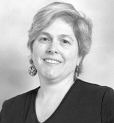 LAURA
GOLDIN is a certifiable bar junkie. She and her husband met when
both belonged to the Conference of Delegates, a group Goldin
ultimately chaired. Her father served on the board of governors. She
has attended almost every board meeting for years. All of this, she
believes, has given her a familiarity with State Bar issues that make
her uniquely qualified to join the board herself. LAURA
GOLDIN is a certifiable bar junkie. She and her husband met when
both belonged to the Conference of Delegates, a group Goldin
ultimately chaired. Her father served on the board of governors. She
has attended almost every board meeting for years. All of this, she
believes, has given her a familiarity with State Bar issues that make
her uniquely qualified to join the board herself.
"I think that long involvement gives me
credibility, because I've worked closely and not so closely, agreed
and disagreed, worked through issues with other people in leadership
who are governing the State Bar," Goldin said. "It's given me a
good handle on the issues."
As for the often-controversial conference, she
says, "We need to continue to work on having a separate entity with
an ongoing relationship with the State Bar."
Another key issue in California is how to deal
with the diversity of types of practices, she says. The bar faces the
daunting task of representing and addressing the needs of corporate,
large and small firm lawyers and solo practitioners while at the same
time protecting the public. The board is examining issues such as
multidisciplinary and multijurisdictional practice, which primarily
affect large firms and "at some point, we have to start looking at
what the practice of law means to the rest of us," she said.
Goldin, 48, practices with her husband, Tony
Rothschild, in a two-person San Francisco firm where she handles
family law, probate and bankruptcy.
The couple have a 15-year-old daughter and a
12-year-old son, and two Belgian Tervurans. Goldin also sits on the
board of the new Conservatory Theater Center in San Francisco and is
active in the PTA.
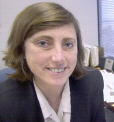 San
Francisco attorney MARIE F. HOGAN says it is not clear where
the State Bar's dues money goes and she is not convinced it is spent
right. "I'm running because I'm concerned about the members
getting the maximum benefits they can for the dollars we're spending
on our dues," she says. San
Francisco attorney MARIE F. HOGAN says it is not clear where
the State Bar's dues money goes and she is not convinced it is spent
right. "I'm running because I'm concerned about the members
getting the maximum benefits they can for the dollars we're spending
on our dues," she says.
A longtime volunteer with the bar's educational
sections - she was chair of the business law section in 1998 and of
the Council of State Bar Sections in 2000 - Hogan believes the
sections offer a lot of bang for the buck in the form of low-cost
continuing education courses and publications. They also help pass
legislation, work with regulators and judges and help make the
practice of law rational. "All without muss or fuss and on their own
nickel" because they are self-supporting, she says.
Hogan can't say the same for the bar, where she
believes technology lags a decade behind that in law firms,
information is not dispersed efficiently and there's little to show
for the amount of dues paid. As the bar rebuilds, Hogan says it is
recreating old problems and she questions its relevancy to its
members' day-to-day practice.
If elected, Hogan, 52, says she has no illusions
but would try to nudge the bar toward improved financial
accountability. She says she'll "look hard at some of the efforts
the bar is undertaking. Are they inner-directed to those who hang
around bar associations or are they directed to the members? I want to
know where the money goes and why we have so few results to show for
it."
An attorney since 1975, Hogan is a business
lawyer practicing in-house with financial institutions. Her husband
also is an attorney, practicing as in-house counsel with the
California State Automobile Association. The couple enjoy skiing and
photography in their spare time.
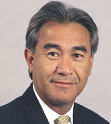 RODERICK
A. McLEOD thinks the State Bar needs to go to its members -
literally. Rather than just affecting those at its margins, the ones
in trouble or those who need help, it should interact better with the
vast majority who pay their dues and don't get in trouble. "We
ought to bring more State Bar programs to local districts, we ought to
knock down or eliminate the perception that the bar is run by a group
of elitists, that the only people who are attracted to the bar are bar
junkies," he says. "Maybe we should host informal gatherings in
each district and not charge bar members anything. Maybe we ought to
give something back instead of taking all the time." RODERICK
A. McLEOD thinks the State Bar needs to go to its members -
literally. Rather than just affecting those at its margins, the ones
in trouble or those who need help, it should interact better with the
vast majority who pay their dues and don't get in trouble. "We
ought to bring more State Bar programs to local districts, we ought to
knock down or eliminate the perception that the bar is run by a group
of elitists, that the only people who are attracted to the bar are bar
junkies," he says. "Maybe we should host informal gatherings in
each district and not charge bar members anything. Maybe we ought to
give something back instead of taking all the time."
And, after a brief pause: "Maybe at every
convention, we ought to hand out free drink coupons to every bar
member who comes and shows his card!"
McLeod, 53, a business litigator and partner with
Brobeck Phleger & Harrison LLP in San Francisco, hasn't been
involved with the bar for the last decade after service in the 1980s
on the board of the Bar Association of San Francisco and a two-year
stint with the conference of delegates. But he watched closely as the
bar's relationship with Sacramento deteriorated during the 1990s, a
relationship that raised questions about how active the bar should be
and what sorts of stands
it ought to take.
Now, he says, it faces big challenges, such as
whether it is structured properly, the efficiency of the discipline
system and the future of the conference of delegates. "I don't
know the policy implications, but I know these are big issues," he
says.
And the major question: "Are we as relevant as
we should be to the regular rank and file member?"
McLeod says representation on the board of
governors has swung in favor of small firm and government lawyers and
as a big firm partner, he would bring some balance to the group.
Married and the father of three children, he
belongs to the Filipino-American Democratic Club, is a former
president of the Filipino Bar Association and recently was appointed
by Gov. Davis to the Bay Conservation and Development Commission.
 ROBERT
H. PEREZ' professional calling has always been public service
and access to legal services for low- and moderate-income people.
It's a motivation he pursued from his early days as a lawyer, when
he helped direct legal services non-profit agencies in East Los
Angeles, Watts and Venice. He went on to create and operate the Model
Cities Center for Law and Poverty in East L.A. and then joined the
State Bar in its legal services division. ROBERT
H. PEREZ' professional calling has always been public service
and access to legal services for low- and moderate-income people.
It's a motivation he pursued from his early days as a lawyer, when
he helped direct legal services non-profit agencies in East Los
Angeles, Watts and Venice. He went on to create and operate the Model
Cities Center for Law and Poverty in East L.A. and then joined the
State Bar in its legal services division.
Perez, 65, later worked in the consumer and
environmental protection section of the San Francisco district
attorney's office and now supervises that city's Department of
Child Support Services.
If elected to the board of governors, that
interest would continue, he says, adding, "I think I have enough
experience and knowledge to be able to be of help to the State Bar."
But he also is interested in helping small firm and solo practitioners
with programs and courses directed towards providing more technical
know-how, business development and in general enabling them to work
more effectively.
He also wants to figure out how to help the
conference of delegates, which he calls "a worthy organization,"
move into a position where it can enjoy free speech without eliciting
negative reaction from legislators and other lawyers. "It's a
great idea to spin it off," Perez says, "but I don't want that
to be a message to the profession or to members that we're totally
disassociating ourselves from them."
In addition to his State Bar involvement, Perez
belongs to La Raza Lawyers East Bay and San Francisco, the Lawyers
Club of San Francisco and has served on the boards of several Hispanic
community agencies, including Centro del Pueblo, a multi-agency
community building in San Francisco, and the Mission Learning Center.
He has five grown children.
 San
Rafael attorney MATTHEW N. WHITE offers a simple platform in
his run for the board of governors: Are the members of the State Bar
getting their money's worth? He believes the bar exists to serve its
members, and as someone who has been writing his own dues checks for
almost 20 years, he says the issue of how the money is spent is
particularly relevant. "I think before the State Bar decides to do
anything, it has to ask, 'How is this going to benefit the
members?'" he says. San
Rafael attorney MATTHEW N. WHITE offers a simple platform in
his run for the board of governors: Are the members of the State Bar
getting their money's worth? He believes the bar exists to serve its
members, and as someone who has been writing his own dues checks for
almost 20 years, he says the issue of how the money is spent is
particularly relevant. "I think before the State Bar decides to do
anything, it has to ask, 'How is this going to benefit the
members?'" he says.
As the sole proprietor of his personal injury
firm, White, 47, also has to find and pay for continuing education
courses, "so I know how hard it is to find meaningful classes. Those
programs have to be available, accessible, affordable and most
importantly, they have to be meaningful," he says, particularly
those addressing special subject areas such as bias and substance
abuse.
In addition, solo and small firm lawyers, who
usually don't enjoy the luxury of having full-time bookkeepers and
accountants, are fearful of becoming targets of the bar's
disciplinary unit, White says. "There may be a good reason the
system operates as it does, but it's not explained to the members.
We don't know why people are getting singled out for seemingly minor
offenses," he says. "If there's a good explanation, we ought to
know."
White, who has been active in the Marin County
Bar Association for several years, including a current term as its
treasurer, says he was approached by several individuals to become a
candidate for election. He says the board should be representative of
the membership and include attorneys from big and small cities, as
well as bar junkies and those who have more limited experience with
the organization.
White also belongs to the American Trials Lawyers
Association, Consumer Attorneys of California and serves as a judge
pro tem in Marin and San Francisco.
In addition to his practice, which includes
litigation and ADR work, White is of counsel to an eight-lawyer
commercial litigation practice. He and his wife have two children, and
he plays in a lawyers' softball league in his spare moments.
DISTRICT 6
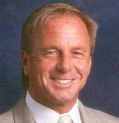 JAMES
O. HEITING thinks it would be a good idea if an attorney who
misbehaves enough to warrant court-imposed sanctions is sent instead
to a short ethics course, not unlike traffic school. "It's
embarrassing, it's costly, it's time-consuming," he says. JAMES
O. HEITING thinks it would be a good idea if an attorney who
misbehaves enough to warrant court-imposed sanctions is sent instead
to a short ethics course, not unlike traffic school. "It's
embarrassing, it's costly, it's time-consuming," he says.
Although he hasn't made much headway with his
proposal in Riverside County due to a lack of enabling legislation,
it's a notion he wants to pursue on a statewide level.
Elected because he ran unopposed, Heiting, a
53-year-old Riverside plaintiffs attorney, made ethics the cornerstone
of his presidency of the county bar association, founding its School
of Ethics and Advocacy and co-authoring "Guidelines of Professional
Courtesy and Civility," a professional responsibility brochure.
As a former president of The Other Bar, the State
Bar's support group for alcoholics, Heiting also is keeping an eye
on the new attorney diversion program for alcohol and drug abusers. He
was involved in drawing the legislation which mandates the program and
hopes it will be a positive, not a negative, experience for addicted
attorneys.
Heiting acknowledges what he calls "a bumpy
past," which includes a 1987 conviction for driving under the
influence causing injury, resulting in a five-year stayed suspension
and five years of probation from the bar in 1988. It was the help of
judges and other lawyers that enabled him "to regain my footing and
become grounded in the ideals of service," Heiting says.
He currently sits on the executive committee of
the conference of delegates and believes it's time to separate the
group from the State Bar. "I think anything to give the conference
more autonomy and the ability to do what they think is right and still
give the State Bar the distance they need to do what they think is
right benefits both bodies," he says. "I think if they live
together as they have, it'll continue to be a struggle."
Married for more than 30 years, Heiting and his
wife are parents of three grown sons. A sports buff, he plays softball
and tennis, throws horseshoes and likes to ride his Harley.
DISTRICT 7, OFFICE 1
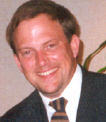 The
board of governors needs a fresh perspective and Los Angeles deputy
district attorney STEVEN J. IPSEN thinks he's the man to
provide it. He is not anti-bar nor does he have a negative agenda, he
says, "but I do think a fresh perspective can be beneficial to any
large organization. The State Bar, while its actions may be
well-intended, has taken some wrong turns." The
board of governors needs a fresh perspective and Los Angeles deputy
district attorney STEVEN J. IPSEN thinks he's the man to
provide it. He is not anti-bar nor does he have a negative agenda, he
says, "but I do think a fresh perspective can be beneficial to any
large organization. The State Bar, while its actions may be
well-intended, has taken some wrong turns."
He also suggests that organizations can grow so
large that they may unintentionally start to look out for themselves
rather than those they are meant to represent or protect. And while
cutbacks are routine in the business world, he says, government
institutions "have a great resistance, even when there's a need
for honest cost cutting."
Ipsen, 41, is running on a platform of reducing
"bloated bar dues, the highest in the nation," and halting any bar
participation in political activism or other non-essential functions.
He says it's difficult to justify an annual budget of $100 million,
particularly when New York, a state much like California, charges
about half as much for bar dues. "I'm unable to find any state
that even approaches the bar dues California lawyers pay, and that's
a problem," Ipsen says.
As a career prosecutor and now president of the
Association of Deputy District Attorneys, Ipsen supports developing a
system under which bar prosecutors could assist government prosecutors
to properly discipline lawyers who commit criminal offenses.
"I think an association between bar and
criminal prosecutors can dramatically enhance the ability to prosecute
the small percentage of attorneys who criminally violate the rights of
their clients," he says. "Cross-designation is a great idea."
Ipsen currently works in the Crimes Against Peace
Officers section of the DA's office, and he collects old cars on the
side - too many, he admits.
 Longtime
bar activist MATTHEW ST. GEORGE says he's been involved for
so many years that it's time for him to join the board of governors.
Recovered from his stint as chair of the conference of delegates in
1999, a year that group was virtually penniless, he says he is
familiar with the myriad of bar issues that need to be addressed,
including its responsiveness to members, governance and the future of
the conference. Longtime
bar activist MATTHEW ST. GEORGE says he's been involved for
so many years that it's time for him to join the board of governors.
Recovered from his stint as chair of the conference of delegates in
1999, a year that group was virtually penniless, he says he is
familiar with the myriad of bar issues that need to be addressed,
including its responsiveness to members, governance and the future of
the conference.
"I know we have a duty to protect the public
but we also have a duty to serve our members and the two go hand in
hand," says the 52-year-old Los Angeles deputy city attorney. He
wants the bar to provide more benefits to the membership, including
online legal research tools, particularly for small firm and solo
practitioners who may not be able to afford them, and insurance
programs tailored to all levels of membership, "at a greatly
discounted rate."
As for the conference so dear to St. George's
heart, he says, "We are still going to be associated with the State
Bar, we are still going to be meeting. The State Bar is the only
organization that can bring us together."
That said, he wants the conference "to be its
own entity," able to take positions that do not violate court
decisions or place the bar in political peril. "We want to protect
the State Bar itself from becoming a lightning rod," he said.
St. George has worked in the city attorney's
office since 1985 and is now supervisor of the police administrative
law section, a new unit which provides advice and assistance to the
Los Angeles Police Department's internal affairs group. He has
served as president of the Los Angeles Lawyers for Human Rights and is
a member of the Los Angeles County Bar Association's board of
trustees.
He and Roy Williams, his partner of 26 years,
live in Mar Vista. St. George runs marathons, likes to travel and as a
one-time history major, loves reading history books.
DISTRICT 7, OFFICE 2
 Los
Angeles family law mediator MICHELLE "MICKEY" KATZ wants to
see the State Bar expand the scope of member benefits and services,
shift the discipline system's focus to rehabilitative efforts and
boost its technology efforts to provide more online services,
including member billing and MCLE. But it is her lengthy background in
mediation and collaboration where she believes she can make a
difference. Los
Angeles family law mediator MICHELLE "MICKEY" KATZ wants to
see the State Bar expand the scope of member benefits and services,
shift the discipline system's focus to rehabilitative efforts and
boost its technology efforts to provide more online services,
including member billing and MCLE. But it is her lengthy background in
mediation and collaboration where she believes she can make a
difference.
Katz, 60, suspects the gubernatorial veto of the
bar's dues bill and subsequent financial crisis might largely have
been avoided if both sides had been able to work together effectively.
"I believe if people can act collaboratively, even people of diverse
interests, they can come up with solutions that meet everyone's
needs," she said.
Katz' long history of bar activism includes
serving on the boards of the Beverly Hills Bar Association and bar
foundation, former member of the State Bar's family law section
executive committee and chair of the bar's Committee on Alternative
Dispute Resolution. It was while serving on that committee that the
dues bill was vetoed and Katz "had a visceral reaction that if we
don't have a State Bar, so many services and opportunities to serve
the legal profession will be missed."
Now, she says, she has "a chance to use my
experience as a person who has worked in State Bar activities to
educate the public and educate lawyers. And I might have some kind of
input into avoiding the kinds of situations that caused that
crisis."
Katz is running as a team with Matt St. George,
who is seeking the office 1 seat in District 7. Both are endorsed by
the Breakfast Club, a group of Los Angeles attorneys who help select
candidates for the board, Women Lawyers of Los Angeles and the Mexican
American Bar Association.
Katz thinks experience is a benefit, not a
drawback, and "who better to serve on the bar board" than those
"who've been involved and care passionately about the bar."
The single mother of a 31-year-old daughter, Katz
loves the theater and the arts.
The State Bar is a staff-driven organization,
controlled by insiders who rubber-stamp their recommendations
irrespective of whether they will benefit the members. At least,
that's what Los Angeles lawyer DAVID M. MARCUS thinks, and he'd
like to see some changes. If the board's decisions are in the best
interests of the members, he'll support them. "To the extent (the
board) may make decisions and spend money that are not in the best
interest of lawyers, I want to be there," he says.
A real property trial lawyer for 22 years, Marcus
also thinks the bar "is largely irrelevant and how it works is a
mystery. I'd like to make it more relevant and less of a mystery."
Although his candidacy statement says he is
neither a bar junkie nor an insider, Marcus took pains in an interview
to say he's also "certainly not some anti-establishment
radical." His goal, he says, is to make certain the bar spends its
money wisely and offers better services to its members. "The staff
may need more oversight because they may make decisions which are not
in the best interests of all lawyers," he says.
The bar could be truly helpful to California's
lawyers by providing help when they need it, whether with professional
or financial issues, substance abuse or problems with clients by
offering free, confidential referrals for assistance, Marcus suggests.
The ethics hotline should be expanded and copies of model retainer
agreements and the rules of professional responsibility should be
provided to every lawyer.
His pet peeve, Marcus says, is the long wait at
security lines in courthouses, and he believes the bar should work
with the courts to develop a system to streamline the ability of
lawyers who pose no threat to get into the courthouse without
compromising security.
Marcus, 49, is a principal with Marcus, Watanabe,
Snyder and Dave, LLP, has served as a judge pro tem, and taught MCLE
courses. He and his wife, Mary Strobel, who was appointed last month
to the Los Angeles County bench, have two children, 11 and 8.
DISTRICT 8
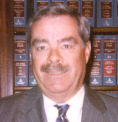 After
31 years in practice and lengthy service on a variety of bar boards
and commissions, 58-year-old RICHARD L. DOMBROW thinks it's
time to move on to the board of governors. After
31 years in practice and lengthy service on a variety of bar boards
and commissions, 58-year-old RICHARD L. DOMBROW thinks it's
time to move on to the board of governors.
Following terms as chair of the Board of Legal
Specialization and the Family Law Advisory Commission and "getting
to that stage where I want to look to the end of my career," he
said, "it seemed like the next logical step."
The State Bar is correctly focused on its
survival, rebuilding and getting itself on an even keel, he said. He
favors separating the conference of delegates, which he called "a
political action committee" which supports positions that do not
enjoy unanimity among the membership.
"They have perhaps taken positions that may not
have represented the majority of the bar and it could have been done
better by an independent private group rather than an arm of the State
Bar," he says.
As a family law practitioner in Santa Ana, he
sees abuses in his field by non-lawyers and as a once-a-month judge
pro tem in bankruptcy, he sees "a really poor quality of work coming
out of paralegals who are practicing. It really, really hurts the
consumer."
Dombrow favors increased prosecution by district
attorneys and says the bar also has a responsibility to protect the
public.
As a self-employed attorney, Dombrow says he long
ago learned to force himself to take time off. And he does - 16
weeks a year, much of it spent traveling with his family. He has
visited 58 countries with his youngest daughter, now a college
freshman. "I believe lawyers should have a quality of life," he
explains, adding that he fishes, hunts and owns an airplane which he
flies four times a week.
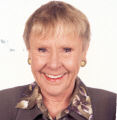 If
elected, GRACE E. EMERY would be the first woman to represent
Orange County on the board of governors, a prospect the 75-year-old solo practitioner thinks is long
overdue. If
elected, GRACE E. EMERY would be the first woman to represent
Orange County on the board of governors, a prospect the 75-year-old solo practitioner thinks is long
overdue.
But her most immediate State Bar-related concern
is the future of the conference of delegates, where she has served as
a delegate for 15 years. "They've had a difficult relationship
with the bar for several years, and I think the solution will be to
sever the two, make the conference as independent as the Foundation of
the State Bar but still linked in the sense that they are State Bar
entities," she said.
As a self-supporting and independent body, Emery
added, the conference's business "can be conducted in the free
spirit it should be conducted in."
Like her opponents in District 8, Emery says a
key issue in Orange County is the unauthorized practice of law by
non-lawyers. "General practices have been affected since non-lawyers
are now allowed to do certain functions," she explained.
"But there's no such thing as a simple will
or a simple contract. They all need some type of legal scrutiny."
Emery, who says a principal part of her life as a
single woman is bar activities, has a long list on her resume: past
president of California Women Lawyers and Orange County Women Lawyers,
current member of the Commission on Judicial Nominees Evaluation,
active in bar association sections, a founding member of the county
chapter of the Federal Bar Association and a director of the Orange
County bar's Public Law Center.
She practices employment law in the city of
Orange and in her spare time likes to walk, swim and read. Election to
the board, Emery said, "will be a grand experience for me."
 Fullerton
attorney JACK P. HOLMES says he's running for the board of
governors for three main reasons: to protect the public by halting the
unauthorized practice of law, to provide more services for new lawyers
and to develop a fair continuing education program based on a sliding
scale of years of practice. "I'm at that point in my life and
career where I want to get involved at the State Bar level," he
says. Fullerton
attorney JACK P. HOLMES says he's running for the board of
governors for three main reasons: to protect the public by halting the
unauthorized practice of law, to provide more services for new lawyers
and to develop a fair continuing education program based on a sliding
scale of years of practice. "I'm at that point in my life and
career where I want to get involved at the State Bar level," he
says.
Holmes says non-lawyers prey on the immigrant
community in San Diego, Los Angeles and Orange counties, and he wants
the State Bar to obtain the authority to act against them.
"Since the bar can regulate admissions, it
should be able to regulate people who interfere with that licensing
scheme," he says.
A former peace officer, Holmes says local law
enforcement does not have the resources to fight unauthorized
practice. But if the bar were authorized to act, "we're helping
our own profession," he says.
Holmes, who handles business litigation, personal
injury and immigration matters, also would like to see extra help such
as a mentoring program for new lawyers, particularly those who strike
out on their own and do not enjoy the kind of support a large firm
provides. "A guiding hand is very helpful and I think a lot of
people would flock to it," he says.
The bar should be cautious about separating
itself from the conference of delegates, Holmes says, adding he thinks
perhaps it should be improved rather than discarded. He says he has
learned from his service as vice chair of the Anaheim Community
Services Board that if a unit of government, such as the conference,
does not belong, it should be made independent, "but save what you
can."
A former security officer in the Air Force, state
game warden and a school district police officer, Holmes, 41, now
provides a community college scholarship to a student who aspires to a
career in law enforcement or as a paralegal. He and his wife have a
24-year-old daughter and a 4-year-old granddaughter. A former karate
enthusiast, he holds a second degree black belt.
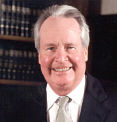 RICHARD
W. MILLAR JR. will be wrapping up his term as president of the
Orange County Bar Association just about the time new members of the
board of governors will be sworn in. It would be a convenient time for
him to join that incoming group, he says, and his long experience with
the local bar and the American Bar Association's House of Delegates
makes him a good candidate. RICHARD
W. MILLAR JR. will be wrapping up his term as president of the
Orange County Bar Association just about the time new members of the
board of governors will be sworn in. It would be a convenient time for
him to join that incoming group, he says, and his long experience with
the local bar and the American Bar Association's House of Delegates
makes him a good candidate.
"I'm pretty well up on the issues du jour and
think that because of my experience, I'm certainly as qualified as
anyone to serve on the board of governors," says the 63-year-old
Millar.
His immediate concerns about the legal profession
primarily involve the issues of multijurisdictional and
multidisciplinary practices, both under consideration by the State Bar
and by other bars throughout the country. He favors state control over
lawyers who practice within their boundaries and opposes any erosion
of that control over lawyers who could practice in multiple
jurisdictions.
The notion of multidisciplinary practice, Millar
says, has somewhat been derailed by the Enron/Arthur Andersen scandal,
which has pointed up the conflicts of interest when professionals
perform more than one service, such as accounting and consulting.
Millar served on a panel which recently studied the issue of
multidisciplinary practice.
A trial lawyer for more than 35 years, Millar
co-founded Millar, Hodges & Bemis in Newport Beach in 1979, and
specializes in business and real estate litigation. In addition to
numerous Orange County Bar Association activities, he has served as a
judge pro tem in Orange County Superior Court and is a fellow of the
American Bar Foundation.
He and his wife, Nancy, have three grown children
and six grandchildren.
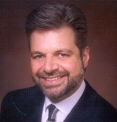 Irvine
attorney JOEL S. MILIBAND has been involved with local or State
Bar activities since entering practice in 1977 and believes that long
experience makes him well-qualified to serve on the board of
governors. "I've always felt it's a way to give back to the
profession by being involved in the organized bar and working for
lawyers, and it also is an opportunity to give back to the
community," he says. Irvine
attorney JOEL S. MILIBAND has been involved with local or State
Bar activities since entering practice in 1977 and believes that long
experience makes him well-qualified to serve on the board of
governors. "I've always felt it's a way to give back to the
profession by being involved in the organized bar and working for
lawyers, and it also is an opportunity to give back to the
community," he says.
He is emphasizing access to justice issues in his
campaign, as well as lawyer self-governance and the importance of
professionalism, civility and solid ethics.
"On a statewide level, there's been a tension
over the years between who really governs the profession, with the
involvement of the legislature and the involvement of the Supreme
Court, which really does set the governance of the board," Miliband
says. "I support the Supreme Court on those issues."
He also believes the State Bar should assist
local bars meet their obligations to provide access to justice to
everyone who needs it.
A longtime participant in the conference of
delegates, including a term as chair of the local delegation, he says
the conference offers a wonderful opportunity to California lawyers to
help shape the laws in the state. "To the extent the conference
sticks to those issues and doesn't go beyond its purview, it's a
benefit for all lawyers and the citizens of the state," he says. At
the same time, forcing lawyers to support its positions is
inappropriate, Miliband says, and voluntary contributions are the
proper way to fund the conference.
Miliband, 49, handles complex civil and business
litigation as well as corporate insolvency as a partner in Rus,
Miliband & Smith. He was president of the Orange County Bar
Association in 2000 and of the Desert Bar Association in 1988 and has
chaired numerous bar committees. He also is a member of many
professional organizations, including the American Bar Association,
the Association of Business Trial Lawyers and the Commercial Law
League of California.
He has three grown children and enjoys playing
golf and traveling when he has time.
 These
profiles were prepared by Nancy McCarthy. These
profiles were prepared by Nancy McCarthy.
|

